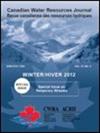Assessing climate change impacts on North American freshwater habitat of wild Atlantic salmon - urgent needs for collaborative research
IF 1.7
4区 环境科学与生态学
Q3 WATER RESOURCES
引用次数: 3
Abstract
Abstract Climate change and human activities have dramatically affected all ecosystems inhabited by Atlantic salmon, causing drastic population declines. Change in river temperature dynamics (e.g. daily variability, frequency, and duration of summer maximum, warmer thermal regimes) is of special concern as it impacts growth rates, reproductive success, prey abundance and phenology, timing of migration, and ultimately survival. The Atlantic Salmon Research Joint Venture held a workshop to address the effects of climate change on freshwater habitats of Atlantic salmon and identify research gaps and priorities. Here we summarize the state of the science for three key themes identified by workshop participants: (1) Effects of climate change on in-river habitat conditions, (2) Physiological and behavioral responses of salmon to temperature, and (3) Population-level responses of salmon to climate change. The group highlighted the crucial importance of understanding and monitoring the links between river temperature dynamics and physiological requirements of Atlantic salmon across different life stages and habitat conditions, with a focus on freshwater life stages. Climate change will undoubtedly continue to affect instream habitats across all seasons and render challenging conditions for all freshwater Atlantic salmon life stages. Hence, we call for urgent interdisciplinary collaborations and partnerships among scientists and managers to address the pressing research gaps that require large-scale data integration across life cycle stages and ecosystems. More collaboration between scientists, managers, and interest groups is needed to ensure that fundamental science directly addresses the knowledge-action gap to enhance evidence-based decision-making and conservation. Climate change and anthropogenic activities are affecting Atlantic salmon habitat characteristics, leading to physiological and behavioral changes that determine both the individual and population level potential for adaptability. Although climate change affects all aspects of the Atlantic salmon life cycle and habitats across the watersheds-ocean continuum, this workshop focused on changes in thermal and hydrological river regimes.评估气候变化对野生大西洋鲑鱼北美淡水栖息地的影响-迫切需要合作研究
摘要气候变化和人类活动极大地影响了大西洋鲑鱼栖息的所有生态系统,导致种群数量急剧下降。河流温度动态的变化(例如,夏季最大值的每日变化率、频率和持续时间、温暖的热状态)特别令人担忧,因为它会影响生长率、繁殖成功率、猎物数量和表型、迁徙时间以及最终的生存。大西洋鲑鱼研究合资企业举办了一次研讨会,讨论气候变化对大西洋鲑鱼淡水栖息地的影响,并确定研究差距和优先事项。在这里,我们总结了研讨会参与者确定的三个关键主题的科学状况:(1)气候变化对河流栖息地条件的影响,(2)鲑鱼对温度的生理和行为反应,以及(3)鲑鱼对气候变化的种群水平反应。该小组强调,了解和监测大西洋鲑鱼不同生命阶段和栖息地条件下的河流温度动态和生理需求之间的联系至关重要,重点关注淡水生命阶段。毫无疑问,气候变化将继续影响所有季节的河流内栖息地,并为大西洋淡水鲑鱼的所有生命阶段提供具有挑战性的条件。因此,我们呼吁科学家和管理者之间进行紧急的跨学科合作和伙伴关系,以解决迫切需要跨生命周期阶段和生态系统进行大规模数据整合的研究差距。科学家、管理人员和利益集团之间需要更多的合作,以确保基础科学直接解决知识-行动差距,从而加强循证决策和保护。气候变化和人为活动正在影响大西洋鲑鱼的栖息地特征,导致生理和行为变化,这些变化决定了个体和种群水平的适应性潜力。尽管气候变化影响着大西洋鲑鱼生命周期的方方面面和整个流域海洋连续体的栖息地,但本次研讨会的重点是热和水文河势的变化。
本文章由计算机程序翻译,如有差异,请以英文原文为准。
求助全文
约1分钟内获得全文
求助全文
来源期刊

Canadian Water Resources Journal
WATER RESOURCES-
CiteScore
2.90
自引率
5.90%
发文量
17
审稿时长
>12 weeks
期刊介绍:
The Canadian Water Resources Journal accepts manuscripts in English or French and publishes abstracts in both official languages. Preference is given to manuscripts focusing on science and policy aspects of Canadian water management. Specifically, manuscripts should stimulate public awareness and understanding of Canada''s water resources, encourage recognition of the high priority of water as a resource, and provide new or increased knowledge on some aspect of Canada''s water.
The Canadian Water Resources Journal was first published in the fall of 1976 and it has grown in stature to be recognized as a quality and important publication in the water resources field.
 求助内容:
求助内容: 应助结果提醒方式:
应助结果提醒方式:


